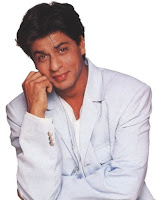

Name: Shah Rukh Khan
Called: The King Khan, Baadshah of Bollywood
Day of Birth: 2nd of November, 1965
Place of Birth: Talwar Nursing Home (Rajinder Nagar) New Delhi-India
Shah Rukh was born with the umbilical cord entangled around his neck. A nurse said that it was by the blessings of Hanuman and that he would be a very lucky child.
Mother: Fatima Begum (a social worker and a first class magistrate, who died of complications from diabetes in 1991)
Father: Mir Taj Mohammed (a lawyer and a freedom fighter, who died of cancer in 1981)
Siblings: One sister named Shehnaz fondly called Lala Rukh
Zodiac Sign: Scorpio
Height: 5'9'' (around 1,75 m)
Weight: around 75 kg
Eyes: magic brown
Hair Color: shiney black Education:
High School: St. Columbia High School In New Delhi.
College: Graduated from Hansraj College, & then Masters in Mass Communication from Jamiya Miliya Islamiya, New Delhi
Qualifications and Achievements:
Masters; A Brilliant Student
Sword of Honour to the most outstanding student
The Ravi Subramani award
The Sujit Memorial award
He captained all teams in football, hockey, and cricket
He was also good in dramatics
He was a king in Hindi, Electronics, Biology
Occupation: actor, producer
If not an Actor: In the arm force or a school teacher.
Start his Career: in a TV serial called "Fauji"
Film Debut: Deewana (2002)
Hobbies & Interests: his family, his work, playing computer games
Martial Status: Married, since October 25, 1991 with Gauri Chibber / Khan (born 8th of October 1970)
Children: son Aryan (born on the 13th of November, 1997) daughter Suhana (born on 22nd of May 2000)
Web Link: www.shah-rukh-khan.info/
Called: The King Khan, Baadshah of Bollywood
Day of Birth: 2nd of November, 1965
Place of Birth: Talwar Nursing Home (Rajinder Nagar) New Delhi-India
Shah Rukh was born with the umbilical cord entangled around his neck. A nurse said that it was by the blessings of Hanuman and that he would be a very lucky child.
Mother: Fatima Begum (a social worker and a first class magistrate, who died of complications from diabetes in 1991)
Father: Mir Taj Mohammed (a lawyer and a freedom fighter, who died of cancer in 1981)
Siblings: One sister named Shehnaz fondly called Lala Rukh
Zodiac Sign: Scorpio
Height: 5'9'' (around 1,75 m)
Weight: around 75 kg
Eyes: magic brown
Hair Color: shiney black Education:
High School: St. Columbia High School In New Delhi.
College: Graduated from Hansraj College, & then Masters in Mass Communication from Jamiya Miliya Islamiya, New Delhi
Qualifications and Achievements:
Masters; A Brilliant Student
Sword of Honour to the most outstanding student
The Ravi Subramani award
The Sujit Memorial award
He captained all teams in football, hockey, and cricket
He was also good in dramatics
He was a king in Hindi, Electronics, Biology
Occupation: actor, producer
If not an Actor: In the arm force or a school teacher.
Start his Career: in a TV serial called "Fauji"
Film Debut: Deewana (2002)
Hobbies & Interests: his family, his work, playing computer games
Martial Status: Married, since October 25, 1991 with Gauri Chibber / Khan (born 8th of October 1970)
Children: son Aryan (born on the 13th of November, 1997) daughter Suhana (born on 22nd of May 2000)
Web Link: www.shah-rukh-khan.info/
















